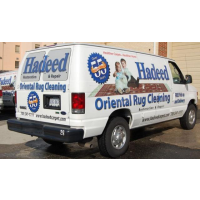Court Rules against Negative Anonymous Yelp Reviews…but only in Virginia
 (photo: Hadeed Carpet)
(photo: Hadeed Carpet)
The online review website Yelp has been ordered by a court in Virginia to reveal the identities of individuals who posted negative reviews of a carpet cleaning company that questioned whether the reviewers were really customers.
Hadeed Carpet Cleaning subpoenaed Yelp to obtain the names of the reviewers, but the website refused to comply. So Hadeed took Yelp to court, where it won a favorable ruling, which was upheld by an appeals court, 2-1.
The company succeeded because Virginia law authorizes the revealing of anonymous Internet users’ real identity as long as those seeking the information can pass a six-step legal test.
In ruling in favor of Hadeed, Judge William Petty wrote: “Generally, a Yelp review is entitled to First Amendment protection because it is a person’s opinion about a business that they patronized. But this general protection relies upon an underlying assumption of fact: that the reviewer was a customer of the specific company and he posted his review based on his personal experience with the business. If this underlying assumption of fact proves false, in that the reviewer was never a customer of the business, then the review is not an opinion; instead, the review is based on a false statement of fact—that the reviewer is writing his review based on personal experience. And 'there is no constitutional value in false statements of fact.’”
Petty added that anonymous speech is protected under the First Amendment, but “defamatory speech is not entitled to constitutional protection.”
Yelp downplayed the ruling, noting that it will only apply in Virginia.
“Other courts and other states have shown support for citizens’ First Amendment right to speak anonymously. Consumers may feel the need to speak anonymously for privacy reasons or for fear of unfair retaliation by a business. This ruling could have a chilling effect on free speech in Virginia and Yelp will continue to fight to protect consumers’ privacy and free speech rights. This ruling also shows the need for strong state and federal legislation to prevent meritless lawsuits aimed solely at stifling free speech,” Yelp said in a prepared statement.
Since the case had First Amendment implications, several media companies and organizations, including The Washington Post, Gannett Co., the Reporters Committee for Freedom of the Press, and the American Society of News Editors, filed friend of the court briefs supporting Yelp.
Matt Zimmerman, staff attorney at the Electronic Frontier Foundation, told the San Francisco Chronicle that the ruling could “have a chilling effect” on people’s decisions to leave negative feedback on Yelp.
He added that some “people think that legitimate criticisms are a dangerous thing.”
-Noel Brinkerhoff
To Learn More:
YELP Critics must be Identified, Court Rules in Online Landscape Altering Decision (by Kellan Howell and Phillip Swarts, Washington Times)
Anonymous Yelp Users Face Identity Disclosure (by Lorraine Bailey, Courthouse News)
Court Tells Yelp It Must Reveal Some Critics' Identities (by Bob Egelko, Caleb Garling and Ben Muessig, San Francisco Chronicle)
Yelp v. Hadeed Carpet Cleaning (Court of Appeals of Virginia) (pdf)
New York to Crack Down on Fake Online Reviews (by Noel Brinkerhoff, AllGov)
- Top Stories
- Unusual News
- Where is the Money Going?
- Controversies
- U.S. and the World
- Appointments and Resignations
- Latest News
- Musk and Trump Fire Members of Congress
- Trump Calls for Violent Street Demonstrations Against Himself
- Trump Changes Name of Republican Party
- The 2024 Election By the Numbers
- Bashar al-Assad—The Fall of a Rabid AntiSemite






Comments